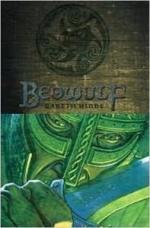{Hrothgar’s nephew, Hrothulf, is present.}
Hrothgar
and Hrothulf. Heorot then inside
Was
filled with friendly ones; falsehood and treachery
The
Folk-Scyldings now nowise did practise.
{Hrothgar lavishes gifts upon Beowulf.}
Then
the offspring of Healfdene offered to Beowulf
30 A golden
standard, as reward for the victory,
A
banner embossed, burnie and helmet;
Many
men saw then a song-famous weapon
Borne
’fore the hero. Beowulf drank of
The
cup in the building; that treasure-bestowing
35 He needed
not blush for in battle-men’s presence.
{Four handsomer gifts were never presented.}
Ne’er
heard I that many men on the ale-bench
In
friendlier fashion to their fellows presented
Four
bright jewels with gold-work embellished.
’Round
the roof of the helmet a head-guarder outside
40 Braided
with wires, with bosses was furnished,
That
swords-for-the-battle fight-hardened might fail
Boldly
to harm him, when the hero proceeded
{Hrothgar commands that eight finely caparisoned steeds be brought to Beowulf.}
Forth
against foemen. The defender of earls then
Commanded
that eight steeds with bridles
45 Gold-plated,
gleaming, be guided to hallward,
Inside
the building; on one of them stood then
An
art-broidered saddle embellished with jewels;
’Twas
the sovereign’s seat, when the son of King Healfdene
Was
pleased to take part in the play of the edges;
50 The famous
one’s valor ne’er failed at the front when
Slain
ones were bowing. And to Beowulf granted
The
prince of the Ingwins, power over both,
O’er
war-steeds and weapons; bade him well to enjoy them.
In
so manly a manner the mighty-famed chieftain,
[37] 55 Hoard-ward of heroes, with horses and jewels
War-storms
requited, that none e’er condemneth
Who
willeth to tell truth with full justice.
[1] Kl. suggests ‘hroden’ for ‘haten,’ and renders: Then quickly was Heorot adorned within, with hands bedecked.—B. suggests ‘gefraetwon’ instead of ‘gefraetwod,’ and renders: Then was it commanded to adorn Heorot within quickly with hands.—The former has the advantage of affording a parallel to ‘gefraetwod’: both have the disadvantage of altering the text.
[2] The passage 1005-1009 seems to be hopeless. One difficult point is to find a subject for ‘gesacan.’ Some say ‘he’; others supply ‘each,’ i.e., every soul-bearer ... must gain the inevitable place. The genitives in this case are partitive.—If ‘he’ be subj., the genitives are dependent on ‘gearwe’ (= prepared).—The ‘he’ itself is disputed, some referring it to Grendel; but B. takes it as involved in the parenthesis.




